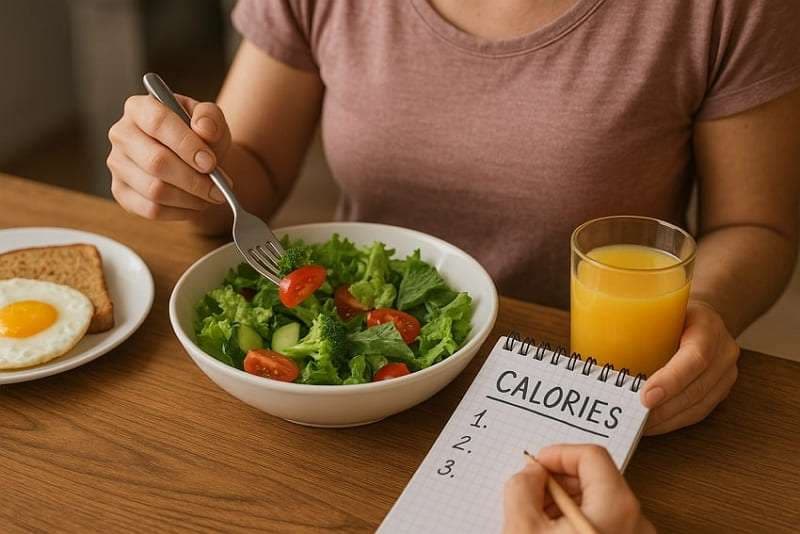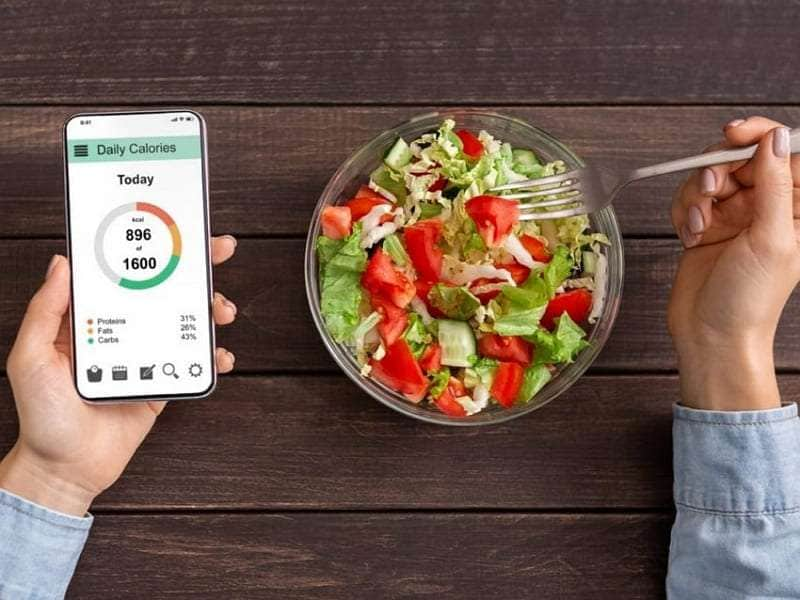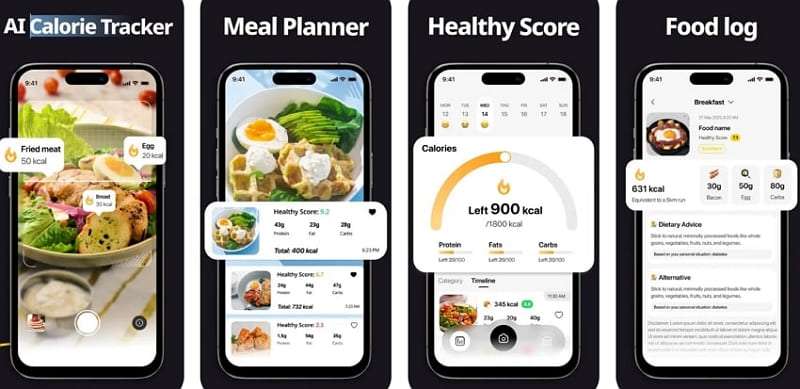Pretend you have been working out, skipping late-night meals, and drinking water instead of soda, and the scale barely moves. This confusion leads to an understanding of the calorie deficit, which is the master key to weight management. It's the moment you realize that exercise alone isn't enough; what matters is the calories you intake and the amount you burn.
To avoid extreme dieting and punishing routines, read this comprehensive article and make sustainable adjustments. From the basic knowledge of calorie deficit to learning how to calculate food calories, you're sorted overall. We will even answer the most asked query about why you're not losing weight on a calorie deficit. For quick results, you're even provided with effective alternatives to maintain or lose weight.
In this article
Part 1. Calorie Deficit in Detail: Basics Everyone Should Know
To explain, the calorie deficit definition is eating fewer calories than your body needs to keep your current weight. When the energy you consume from food and drinks is lower than the energy you burn, your body uses stored fat for fuel. Here, knowledge of calorie deficit comes into play as it changes the focus from restrictive fat diets to a practical approach.

Individuals do not need to exclude entire food groups anymore and starve themselves; instead, create a balanced diet that allows for moderation. Put, you would be losing weight gradually without having to deny yourself the food you love most as long as you are always in a calorie deficit. Even such practical options result in visible outcomes, better health, and a better feeling of control over your body changes.

Part 2. What Should Be Your Calorie Deficit? A Good Rule of Thumb
A daily deficit of 500 calories is a good rule of thumb, guaranteeing you'll never be below the minimum calorie intake of your gender. This quantity causes a gradual loss of weight of approximately 0.5-1kg per week to sustain weight loss in the long term. A slight decrease is still enough to enable your body to receive sufficient energy to support daily activities and other vital body functions.

A detailed knowledge of caloric deficit's meaning will help people set a goal that achieves the proper proportion between consumption and burning. Therefore, a woman needs at least 1,200-1,500 calories, while a man should consume about 1,500-1,800 calories. In simple terms, keeping your deficit at a reasonable level, focusing on nutrient-dense foods, along with physical activity, will enable weight loss without risking your health.
Part 3. How to Safely Adopt a Caloric Deficit Meaning?
Instead of obsessing over the meaning of calorie deficit, explore this section to concentrate on how to adopt it for steady progress:
- Prefer Nutrient-Dense Foods: Consider unprocessed foods, lean proteins, whole grains, or fresh fruits that make you feel full longer. Healthy foods will also benefit your body by repairing it and producing energy; hence, you consume less and have the maximum amount of energy.
- Drink Water: An individual is supposed to have enough water in a day to aid in digestion and to absorb nutrients. Drinking water regularly is a good guideline compared to drinking when you are thirsty.
- Monitor Your Body response: You should have stable energy, hunger that can be satisfied, and not feel any discomfort in your stomach, which all mean that you are on the right path. In addition, fatigue and inability to concentrate should be signs of the necessity to consume more calories to achieve a comfortable balance.
- Reduce the Calories Gradually: Do not make the changes by cutting dramatically or drastically; instead, consider cutting back by approximately 500 calories daily. This kind of gradual reduction enables your body to get adjusted to the new energy equilibrium and makes the process more sustainable in general.
- Get Enough Quality Sleep: You should have adequate quality sleep at night, 7-8 hours of sleep, to prevent disruption of your hunger hormones by lack of sleep. Poor sleep is more likely to cause you to desire eating high-energy foods, and this increases the struggle to maintain the calorie deficit.

Pro Tip. How to Calculate Food Calories to Maintain Calorie Deficit
If you've ever tried to count calories manually, you would know it feels like a chore searching food databases. For this task, a devoted app like CalBye - AI Calorie Counter should be used, which allows users to log meals using text or photos. Both iPhone and Android users can track their meals, making it a convenient guide for any situation.

To help you understand the calorie deficit meaning, the app offers personalized nutrition advice after analyzing your food. The platform demands your age and weight to deliver innovative suggestions, aligning your needs with recommendations. Its innovative AI assistance streamlines food logging and eliminates manual searching fatigue for diet foods. This app also covers all international cuisines to support global users in maintaining their dietary targets.
Key Features
- Provides Nutritional Insights: This calorie-tracking app gives a breakdown of protein, carbs, and more with tips to achieve targets.
- Food Quality Scores: It helps you understand the nutritional content of your food using scores that encourage healthy eating.
- Encrypted Data: Within this app, all users' data is secured and encrypted to protect privacy from unauthorized access.

Part 4. Why You Are Not Losing Weight on Calorie Deficit?
When you've been counting calories, sticking to your plan, and doing everything right, yet the scale refuses to move. In such a case, revisit the calorie deficit definition and explore the following reasons for not losing weight on a calorie deficit:

- Incorrect Calorie Tracking: When you estimate the amount of food on your plate or skip recording snacks, this may cause you to consume much more than you think. You can fill your calorie gap without realizing it, even with condiments such as mayonnaise, salad dressing, or inevitable dips.
- Underestimating Calories in Some Foods: In simple terms, one teaspoon of olive oil may contain more than 100 calories, and it is so easy to pour a little more than you realize. Similarly, nut butters and avocados are healthy but will make you exceed your calorie count quickly, unless you measure them.
- Overestimating Calorie Burn from Exercise: Using gym machines or fitness trackers may lead you to believe you have burned more, which in turn makes you eat more. Instead, exercise should be considered as an addition to your metabolism and not a ticket to have more.
- Not Considering Liquid Calories: A vast variety of beverages, such as sugary soda, flavored coffee, and even nutritious fruit juice, may contain hundreds of calories. You can cut down without altering the major meal by switching to water or herbal tea.
- Inconsistent Deficit During the Week: The majority of individuals are disciplined throughout the week, but tend to relax over the weekends, which will result in larger portions. Anyhow, one indulgent meal won't disturb progress, but several higher-calorie days can cancel out a week's worth of deficit.
Part 5. Alternatives to Maintain/Lose Weight Instead of a Calorie Deficit
Besides the meaning of calorie deficit, the following alternatives can help you manage weight even without strict calorie tracking:
- Regular Exercise: Some exercises are known to burn calories and also enable you to gain muscle mass and a better metabolism. Other than this, resistance training also develops lean muscle that boosts your resting metabolic rate.
- Importance of Staying Hydrated: Drinking water helps control your appetite and improves digestion when you take enough water in a day. Staying hydrated can help keep the body temperature normal and eliminate toxins, which makes it easier to stay active.
- Practical Stress Management: Prolonged stress may cause hormonal imbalance, causing the level of cortisol to rise, and thus may cause fat accumulation. To keep the weight, you may experiment with stress management by meditating, deep breathing, or doing something you enjoy.
- Choosing Nutrient-Dense Foods: Focus on whole and unprocessed foods such as vegetables, whole grains, and healthy fats to facilitate balanced nutrition. When you eat a lot of fiber and other essential nutrients, you will hardly feel the need to count calories.


Conclusion
To conclude, in the venture of weight loss, understanding calorie deficit is the first step toward controlling weight. As explained, when you create a consistent gap between the calories you consume and the calories you burn, you achieve sustainable results. To make this entire process even more convenient, you can refer to the CalBye - AI Calorie Counter for an ultimate personal trainer.

FAQs
-
How long should I stay in a calorie deficit?
The length of time is based on your goal, because being in a calorie deficit for too long can result in nutrient deficiencies. Refeed days or diet breaks are recommended to maintain hormonal balance and have occasional breaks. -
Do I need to count every calorie to be in a deficit?
That's not always the case, because you can even achieve a deficit by controlling portion sizes and choosing whole foods. Most individuals would rather adhere to the 80/20 rule, in which 80 percent of the food is nutrient-dense and 20 percent is flexible. You can use mindful eating habits, such as stopping when you are comfortably full, to generate a deficit without counting. -
Can I eat my favorite foods while in a calorie deficit?
Moderation is the key in the calorie deficit definition, and you can have a treat now and then as long as you are within the target. You can make it more sustainable by treating yourself to small amounts of your favorite foods. In this case, think of creating a lifestyle that you can sustain and not a temporary diet.






